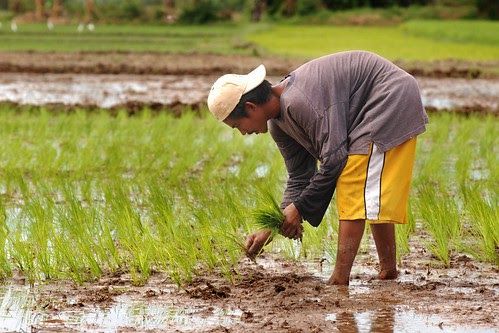What leaders of palay farmers groups have been saying all along– that the reduced tariff on imported rice from 35 to 15 percent did not result in a P1 price cut in the retail market– is now being confirmed by data of the Philippine Statistics Authority since the implementation of EO 62 in August.
The impact on the October rice inflation– at 9.6 percent from 5.7 percent in September– was enough to send President Ferdinand “Bongbong” Marcos, Jr. and his finance chief barking orders to ensure that consumers (most affected by the inflation, which includes the palay farmers themselves) would benefit from the resultant surge in rice imports.
The President on Tuesday, November 5, ordered heightened government intervention– including telling local government units to buy directly palay from the farmers (to up local farmgate prices and bring more benefits to the hapless extreme-weather losers and deploy more Kadiwa stores (mobile and stationary) to provide cheaper rice to consumers.
He also ordered increasing the Kadiwa outlets to 300 from its current network of only 21 by mid-2025.
Finance Secretary Ralph Recto, who all along was boasting about robust financial indicators including softening inflation, is now ordering retailers to reduce their prices and “let the people feel the benefits of low tariffs.”
The Philippine Statistics Authority (PSA) said the reduced import tariffs did not translate to a P1-reduction in rice prices since the implementation of tariff cuts in August.
In a social media post, Marcos tasked the Department of Agriculture (DA) and the National Irrigation Administration to expand the P29 Rice-for-All program and increase the number of Kadiwa ng Pangulo centers from 21 to 300 by mid-2025, Business Mirror reported.
“This will bring affordable rice within reach for more communities across the country,” Marcos said.
To help boost rice production, the President also urged local government units (LGU) to buy palay directly from farmers.
“This way, our farmers receive fair prices for their hard work, and we can secure a steady supply of rice for everyone,” he said.
Expectations fall short
PSA price monitoring showed that regular milled rice prices averaged P50.22 per kilo in October 2024, only 0.44 centavos less than the P50.66 per kilo posted in August 2024 even at the reduced tariff of 15 percent on imported staple.
PSA Undersecretary Claire Dennis Mapa said, “The price of rice, based on the retail price in our outlets, declined but not as fast as we expected.”
Mapa also said their data showed well-milled rice prices in October averaged P55.28 per kilo, only 0.28 centavos less than the P55.56 per kilo average in August this year.
The data also showed special rice prices averaged P63.97 per kilo in October, only 0.11 centavos lower than the P64.08 per kilo average in August 2024.
In October rice inflation picked up again at 9.6 percent for all income households while for the bottom 30 percent, rice inflation remained in double-digits at 10.2 percent.
But Mapa is confident this would continue downward with October inflation just a “blip.”
Holiday surge
The onset of holidays would also result in higher inflation because of brisk demand for Noche Buena feast items like those used for salads.
He said prices of mayonnaise, spaghetti sauce, spaghetti noodles have also increased. But the increase in 250-gram ham items as well as a box of cheese, not quezo de bola variant, remain flat. He admitted though, that these Noche Buena items are not being tracked by PSA.
Owing to the impact of severe tropical storm “Kristine,” inflation increased to 2.3 percent in October 2024, faster than the 1.9 percent posted in September 2024.
The President said he has tasked the Department of Finance and the National Economic and Development Authority to “address the rising input cost and climate impacts that affect food prices. This is a united effort to support our farmers and keep rice prices within reach for every Filipino family,” Marcos said.
“Recent weather disturbances, including Typhoon Kristine, have posed significant challenges to our food supply and logistics. The government is working relentlessly to keep food available and prices steady, particularly for essential commodities,” said NEDA Secretary Arsenio Balisacan.
The NEDA assured the people that the government is vigilant in implementing measures to stabilize prices amid external pressures.
To mitigate the impact of natural disasters, the Department of Social Welfare and Development is implementing the Building on Social Protection for Anticipatory Action and Response in Emergencies and Disasters (B-SPARED) Program.
This initiative provides social safety nets and capacity-building measures to support affected communities.
#WeTakeAStand #OpinYon #OpinYonNews #DA #PSA #RiceTariff
